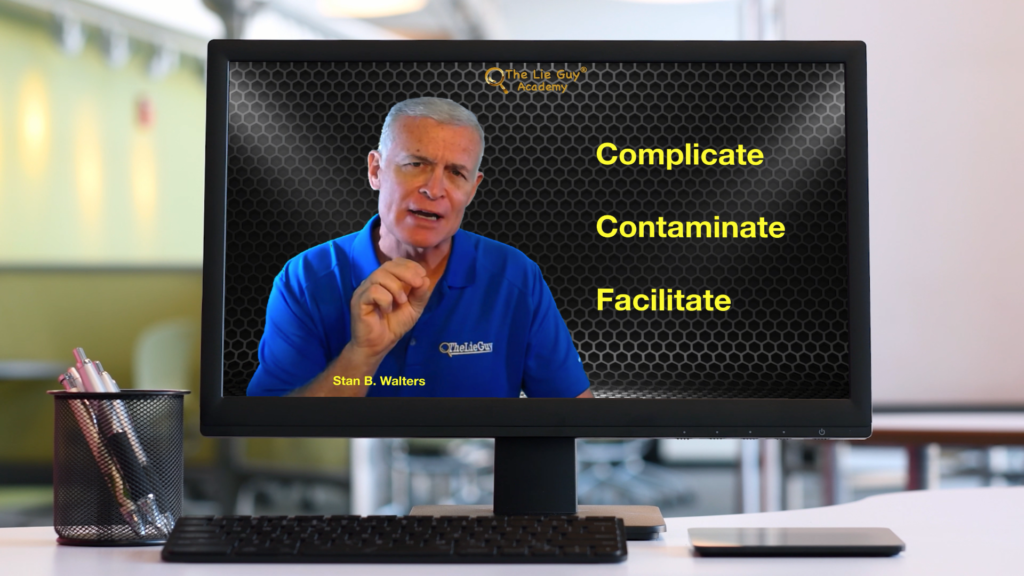9 Ways To Bring Your "A" Game:
Enhance Your Interview and Interrogation Techniques
with Virtual Training.
Elite investigators must continuously update their training in interview and interrogation techniques—skills that many other virtual programs simply can’t match. Mastering these techniques is crucial for obtaining accurate information in every investigation. By participating in our courses, you’ll learn how to establish rapport and trust with witnesses and suspects, as well as detect inconsistencies and deception.
Our courses are led by Stan, a natural instructor who is not only knowledgeable but also highly engaging. His ability to connect with participants and convey complex concepts in an accessible manner sets our training apart.
Courses are available for individuals or groups, catering to both open registrations and in-service agency training. Whether you’re looking to enhance your skills on your own or improve your entire team’s capabilities, we have a program to meet your needs.
Enroll now and discover how effective interview and interrogation tactics can be the difference between closing a case and letting it go cold.
Serving Law Enforcement, Military, and Intelligence Professionals World-Wide
Share
Interview and Interrogation Techniques
Live Virtual Training
Available Courses
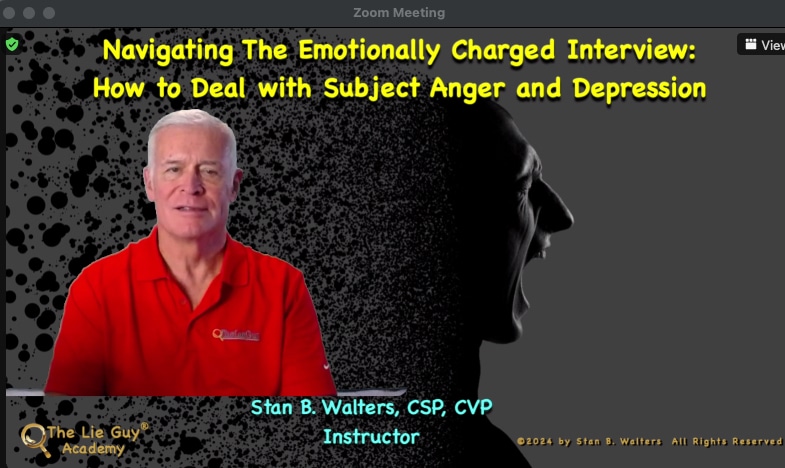
Navigating The Emotionally Charged Interview:
How to Deal with Subject Anger and Depression
-3 Hour Virtual Course
Presented Live
Stan B. Walters, “The Lie Guy®” CSP, CVP – Instructor
Course Description
Invariably, every interviewer will encounter some subjects who will have a strong emotional reaction during their interview. Whether that reaction is exhibited as anger or depression, the presence of either one can create an emotional firestorm that left untreated can cause disastrous results in the interview room and ultimately the case in the courtroom.
The simple truth is that in the vast majority of cases, interviewers are aware of the emotional outbreak but have little or no training on how to properly deal with the problem. Old school interview and interrogation training leads interviewers to believe that the presence or absence of anger is a sign the subject is either truthful or deceptive. The perception about depression is that it is the emotional state which indicates a subject is ready to confess. Those two points of view could not be further from the reality about human emotional reactions and set the interviewer up for a case of self-sabotage.
Interviewers can stabilize a chaotic, highly charged emotional storm that can occur during an interview. Once they understand the difference between a reaction behavior versus a response behavior the plan of action becomes clear. The progress destroying emotional reactions can be redirected toward the far more productive response behaviors and ultimately clear a path to resolution of their subject’s role in the event. The tactics to accomplishing the goal of stabilizing an emotional reaction are easy learn, easy to deploy and produce solid interview results.
Topics Covered:
- Understanding the difference between the subject who is “reacting” or “responding.”
- The impact emotional reactions will have on your interview.
- The connections between Anger and Depression.
- Reliable body language cues indicating Anger and Depression.
- Reliable verbal cues that indicate Anger and Depression.
- Smart tactics for interviewers encountering emotional reactions.
- The misconceptions about and misdiagnosis of Depression and Acceptance.
- Who Should Attend:
- New and Seasoned Detectives and Criminal Investigators
- First Responders
- Regulatory Agents
- Inspector’s General
- Internal Affairs
- Ethics Investigators
- Special Investigations Units
- Human Resources
- Fraud Investigators
- Loss Prevention / Risk Management
- Fire / Arson
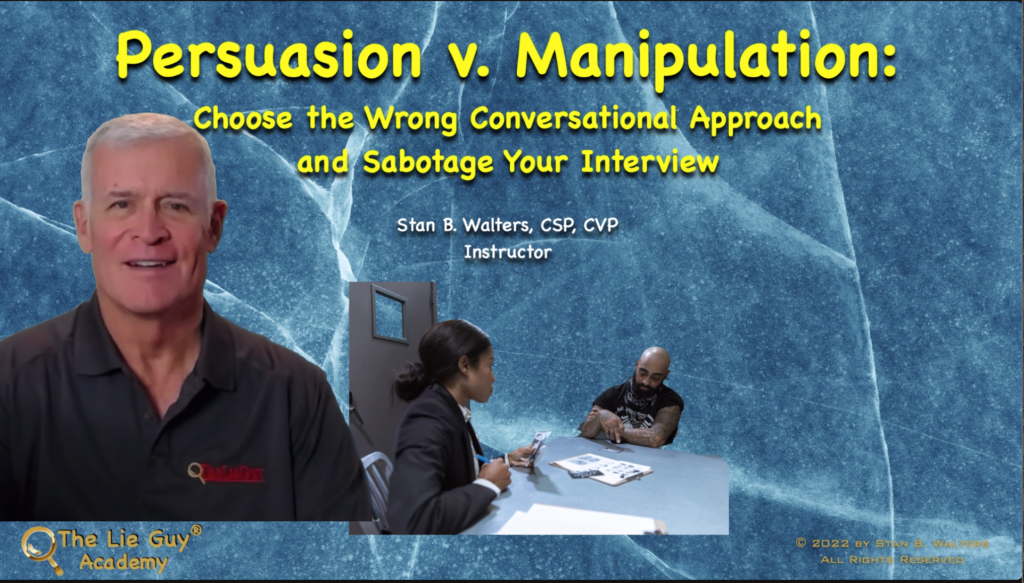
Persuasion vs. Manipulation: Choose the Wrong Conversational Approach and Sabotage Your Interview
-3 Hour Virtual Course
Presented Live
Stan B. Walters, “The Lie Guy®” CSP, CVP – Instructor
Course Description
Ever had an interview that deteriorated into an argument? Were there times you felt like you did all the talking and got nothing from your subject? Perhaps you got to the point you completely ran out of something to say or didn’t know what to say next. Whether it is the victim, witness or suspect, choose the wrong conversational approach and your best effort will provide no results. Don’t feel alone! You’re not the first investigator nor the last investigator to experience similar frustrations.
For nearly 6 decades, investigative interviews have focused on one main approach to interviewing not only suspects by uncooperative victims and witnesses. This one size fits all dominating approach has a dramatically increased risk for contaminated statements and false confessions from suspects and rigid non-compliance by victims and witnesses. A few dedicated investigators have stumbled across more productive and successful techniques but would be hard-pressed to explain their results beyond saying, “I just talked to them.”
In this 3 hour virtual training session you will explore proven methods for creating productive conversations that are easy to learn, just as easy to deploy, and proven scientifically to be very effective in gaining cooperation, compliance and agreement from your subjects. The beauty of the process is that all human beings are programed to listen for and respond to conversational dialogue that they can agree with and take action. Within one hour of this program you will immediately be able to start applying the techniques you will learn.
You Will Learn:
- The distinction between persuasion and manipulation.
- Gain an understanding of the science of influence.
- How the human mind “listens” for verbal dialogue that helps people decide their best course of action.
- The 7 powerful cues that impact your subject’s decision making.
- The “bonus” tactic deemed to be the most powerful tool of influence.
- How to recognize and avoid the “Dark Side” tactics that sabotage current interrogation methods.
- Master the use of ethical and effective “Light Side” tactics for interview and interrogation.
- Understand what it takes for someone to “change their mind” and agree with you.
- A four part process for creating a persuasive dialogue that you can practice by watching TV or listening to radio.
- “When” and “How” to ask your subject for a commitment.
BONUS…These tactics also work in everyday situations at home, at work AND even when negotiating with employees, superiors, and city councils or county magistrates!
Who Should Attend:
- New and Seasoned Detectives and Criminal Investigators
- First Responders
- Regulatory Agents
- Inspector’s General
- Internal Affairs
- Ethics Investigators
- Special Investigations Units
- Human Resources
- Fraud Investigators
- Loss Prevention / Risk Management
- Fire / Arson
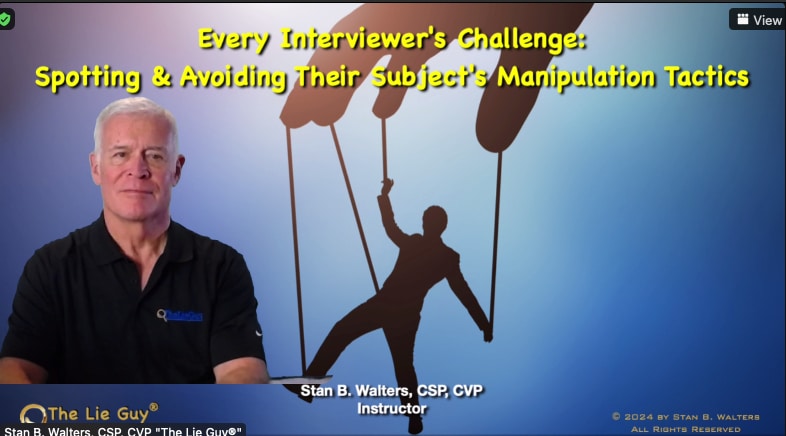
Every Interviewer's Challenge:
Spotting & Avoiding Their Subject's Manipulation Tactics
-3 Hour Virtual Course
Presented Live
Stan B. Walters, “The Lie Guy®” CSP, CVP – Instructor
Course Description:
The simple truth is that we all use some form of coping mechanisms when confronted with the reality that we have made a mistake in judgement or engaged in some form of unacceptable behavior. On the other hand, subjects who have perpetuated some unethical or criminal behavior either deliberately or negligently, have a lot more at stake when forced to face that reality and the possibility of significant consequences.
In light of the fact that your subject may be looking at serious repercussions for their behavior, they may choose to employ numerous tactics that have worked for them in previous similar situations. One of the most notable reactions is for the subject to attempt to “manipulate” anyone who attempts to call attention to and expects an acknowledgment from the subject acted irresponsibly. The goal is get that person to doubt their observations and conclusions and submit to the subject. If the investigator does not recognize and effectively neutralize the subject’s manipulative behavior, the subject’s efforts to sabotage the interview and interviewer will be successful and the investigation will be stymied.
This course will familiarize the interviewer with the concept of “manipulation” and a “dozen” manipulation methods used by a subject to establish and sustain control over the interview and the investigator. Participants will not only learn the signs and characteristics of each tactic but will also learn the countermeasures to neutralize the manipulation effort and render a successful interview.
Participants Will Learn:
- The distinction between influence and persuasion vs manipulation and coercion.
- The role “influence” and “persuasion” play in an interview.
- An in-depth understanding of why subjects use “manipulation.”
- Develop an in-depth understanding of goals of the “dirty dozen” manipulation tools.
- Be able to recognize the “dirty dozen” tactics when they occur.
- How to execute the countermeasures necessary to neutralize manipulation.
- How to create a successful “persuasive argument” in an interview that will facilitate compliance and cooperation.
- Who Should Attend:
- New and Experienced Detectives and Criminal Investigators
- Regulatory Agents
- Inspector’s General
- Internal Affairs
- Ethics Investigators
- Special Investigations Units
- Human Resources
- Fraud Investigators
Loss Prevention / - Risk Management
- Fire / Arson

Electronic Recording of Interviews & Interrogations:
Procedures, Policy, & Design
-3 Hour Virtual Course
Presented Live
Stan B. Walters, “The Lie Guy®” CSP, CVP – Instructor
Course Description:
With increased attention to cases of wrongful conviction and contaminated statements, interviews of victims, witnesses, and suspects is receiving added scrutiny by both criminal and civil courts. This includes not only law enforcement but retail and corporate loss prevention as well. The consequences can be financially staggering!
The simple truth is that despite the sworn testimony of investigators that statements obtained from suspects are voluntary and not contaminated or even coerced, there are increasing legal challenges to show proof via electronic recording. As a result many agencies and several states are establishing policies that require recording of victim, witness and suspect interviews.
Even though the idea of mandatory recording of some interviews and interrogations has been around in since 1984, there are some local, state and federal agencies that are still putting off their decision to record or not record.
This virtual training session will focus on best practices for recording, policy considerations and system designs and storage.
Topics will include:
- Historical Background
- Policy Considerations
- Recording Procedures
- Preservation of Recordings
- Transcription Services
- Recording Applications
- Equipment Selection
- Static Installations
Who Should Attend:
- Investigations Supervisors
- Criminal Investigators
- Academy Directors / Instructors
- Fire / Arson Investigators
- School Resource Officers
- Internal Affairs
- Ethics Investigators
- Inspector’s General
- Prosecutors
- Legal Counsel
- Public Defenders
- Loss Prevention
- Special Investigations
- Underwriters
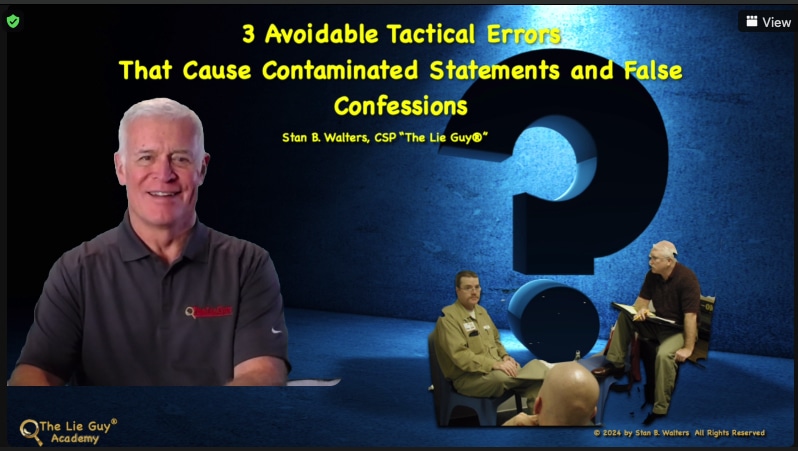
3 Avoidable Tactical Errors
That Cause Contaminated Statements and False Confessions
-3 Hour Virtual Course
Presented Live
Stan B. Walters, “The Lie Guy®” CSP, CVP – Instructor
Elevate Your Interviewing Skills to Safeguard Justice
In 1984, a pivotal shift began in the UK, reaching the US by 1989—a heightened awareness of contaminated statements and false or coerced confessions. This wave of scrutiny has since led to numerous overturned convictions and multi-million dollar lawsuits against US criminal justice agencies. Corporate entities have also faced exposure, with loss prevention and risk management professionals implicated in generating false or coerced confessions.
The Urgent Need for Critical Examination
The rise in awareness has spurred comprehensive legal and scientific investigations to pinpoint the tactics, techniques, and conditions that contribute to these issues. Despite this, many agencies have yet to critically review their in-house or contracted training programs. This oversight means they may continue teaching methods that increase the risk of false confessions and contaminated statements, thereby jeopardizing their cases, personnel, and municipalities with significant legal liabilities.
Transform Your Approach to Interrogation
This course delves into the critical factors that lead to contaminated statements and false confessions, providing you with the knowledge and skills to:
• Understand the Historical Context: Explore the evolution of awareness around false confessions and contaminated statements.
• Identify Risky Tactics and Techniques: Learn which commonly taught methods are most likely to lead to false confessions.
• Implement Best Practices: Adopt evidence-based strategies to minimize the risk of contamination and ensure the integrity of your investigations.
• Protect Your Agency from Liability: Equip yourself with the tools to safeguard your agency against potential legal repercussions.
Join us to refine your interrogation techniques, uphold the principles of justice, and protect your organization from the fallout of contaminated statements and false confessions.
Causes of False Confessions: Identify the three specific factors that lead to false confessions.
• Vulnerable Subjects: Recognize which individuals are most at risk of making false confessions or giving false statements.
• Interview Misconceptions: Debunk common myths about why subjects do or do not speak during interviews.
• Types of Influence: Understand the distinctions between influence, persuasion, manipulation, and coercion.
• Current Philosophies: Evaluate the strengths and weaknesses of interview and interrogation methods taught in academies today.
• Effective Tactics: Discover best practices for reducing the risk of contaminated statements and false confessions.
• Legal Protections: Learn strategies to shield your agency from legal liabilities associated with false confessions.
Who Should Attend:
- New and Experienced Detectives and Criminal Investigators
- Supervisors / F.T.O.s
- Legal Counsel
- Regulatory Agents
- Inspector’s General
- Internal Affairs
- Ethics Investigators
- Special Investigations Units
- Human Resources
- Fraud Investigators
- Loss Prevention / Risk Management
- Fire / Arson
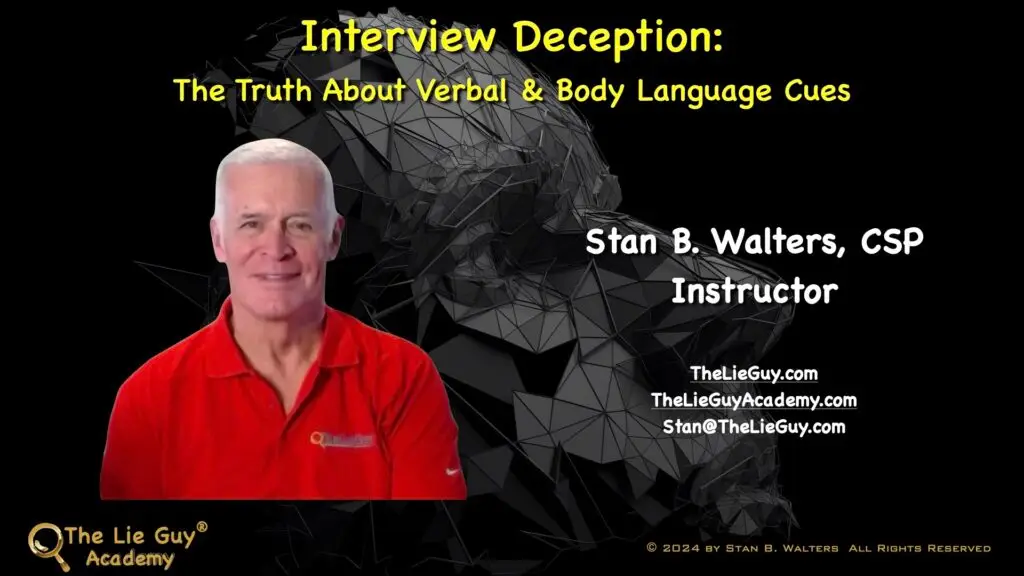
Interview Deception:
The Truth About Verbal and Body Language Cues
-3 Hour Virtual Course
Presented Live
Stan B. Walters, “The Lie Guy®” CSP, CVP – Instructor
Unlock the Secrets to Uncovering the Truth
In the realm of investigation, one universal truth prevails: deception is inevitable. Whether it’s a victim exaggerating their story, a witness distorting facts, or a suspect withholding crucial details, investigators constantly face the challenge of discerning truth from lies.
The Harsh Reality of Lie Detection
Despite common belief, even trained investigators struggle with detecting deception. Astonishingly, the accuracy rate for spotting lies hovers around a mere 50 percent. Ironically, after undergoing traditional training in interview techniques and deception detection, investigators’ success rates can drop to an average of 42 percent or lower. This training often instills a false sense of confidence, leaving them believing they are adept at lie detection when the opposite is true.
Why Do We Fail at Detecting Deception?
Several factors contribute to our poor performance in identifying deception:
1. Myth vs. Reality: Many supposed signs of deception are rooted in myth rather than fact.
2. Missed Cues: Genuine signs of deception are often overlooked.
3. Faint Signals: Real deceptive cues are rare and subtle, requiring skillful questioning to bring them to light.
Transform Your Investigative Skills
This course delves into the intricate world of deception cues, both verbal and nonverbal. You will learn to separate fact from fiction and understand the subtle indicators of deceit. Through comprehensive training, you will significantly reduce your lie-spotting errors and enhance your ability to uncover the truth.
Join us and become a master at detecting deception, turning the odds in your favor and ensuring justice is served.
Participants will explore –
- The origins of “lie spotting.”
- Common myths about “body language cues.”
- How to correctly read and interpret relevant body language.
- Common myths about “verbal cues.” Recognizing the value “speech cues.”
- The two primary forms of deception.
- The mental process of creating deception.
- The mental consequences of sustaining deception.
- The interviewer’s productive response to deception.
Who Should Attend:
- New and Experienced Detectives and Criminal Investigators
- School Resource Officers
- Legal Counsel
- Regulatory Agents
- Inspector’s General
- Interdiction Officers
- Internal Affairs
- Ethics Investigators
- Special Investigations Units
- Human Resources
- Fraud Investigators
Loss Prevention / - Risk Management
- Fire / Arson
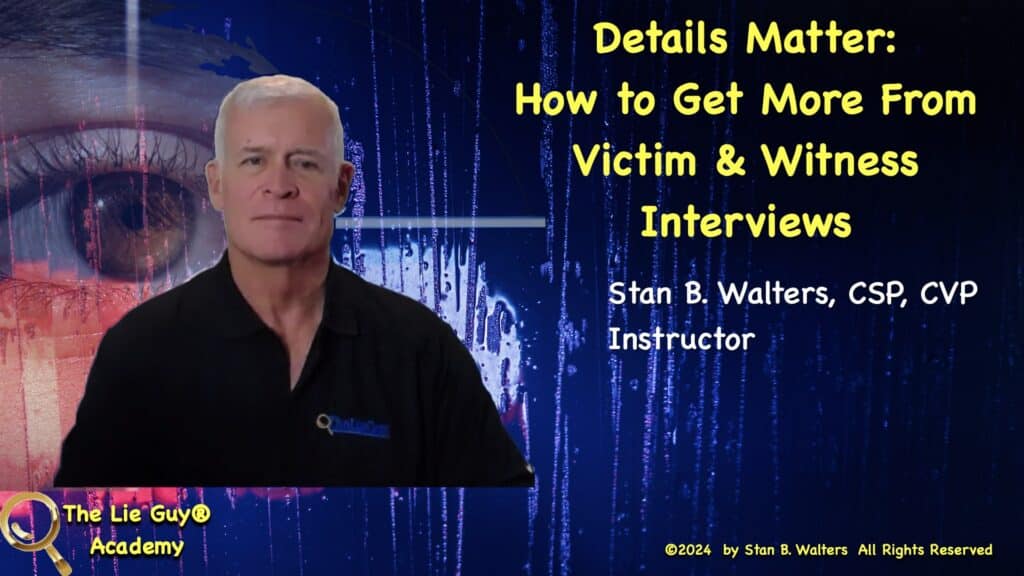
Details Matter:
How to Get More
From Victim & Witness Interviews
-3 Hour Virtual Course
Presented Live
Stan B. Walters, “The Lie Guy®” CSP, CVP – Instructor
Course Description:
Details Matter
“Details matter” should be the mantra of every investigator no matter the type of case. “I didn’t know it was important” or “You didn’t ask me” are just two victim and witness comments that indicate their interviews were incomplete and poorly conducted. The simple truth is most investigators get outdated or at best very rudimentary if any training at all on properly interviewing victims and witnesses.
Consequences
The consequences of poorly conducted interviews during any investigation are virtually unlimited. Statements can be contaminated and compromised. A loss of trust in the investigator by the victim, witness, and even the jury. Prosecutors and / or administrators blinded sided by previously undisclosed information. Time and resources wasted retracing details missed during initial interviews.
Doing it Right!
Because “details matter,” interviews done right the first time increase the amount of information, productive leads, and facilitates a more efficient and focused investigative process. Victims and witnesses are more engaged and cooperative. Fully informed and appropriate administrative or prosecutorial decisions can be made bringing the case to a proper conclusion.
New & Experienced Investigators
This course is designed to help investigators progress their interviewing skills far beyond the basic “5 W’s and 1H” approach to interviewing. It will provide “cutting edge” methods that are easy to learn and deploy while maximizing details retrieved during interviews. Experienced investigators will be “rejuvenated” while new or fairly new investigators will be “educated” about “recall enhancing” methods that produce comprehensive, detail rich interviews.
Participates will:
- Learn how to employ “recall enhancing methods” when interviewing.
- Understand the 3 stages of memory.
- Explore the concept of the “Interviewer Impact Principle.”
- Discover how to gain and maintain victim and witness trust.
- Find out how to avoid common statement contamination pitfalls.
- Get an introduction to the “reality monitoring” concepts.
- Learn to symptoms that identify false statements.
Who Should Attend:
- New and Experienced Detectives and Criminal Investigators
- Legal Counsel
- Regulatory Agents
- Inspector’s General
- Interdiction Officers
- Internal Affairs
- Ethics Investigators
- Special Investigations Units
- Human Resources
- Fraud Investigators
- Loss Prevention / Risk Management
- Fire / Arson
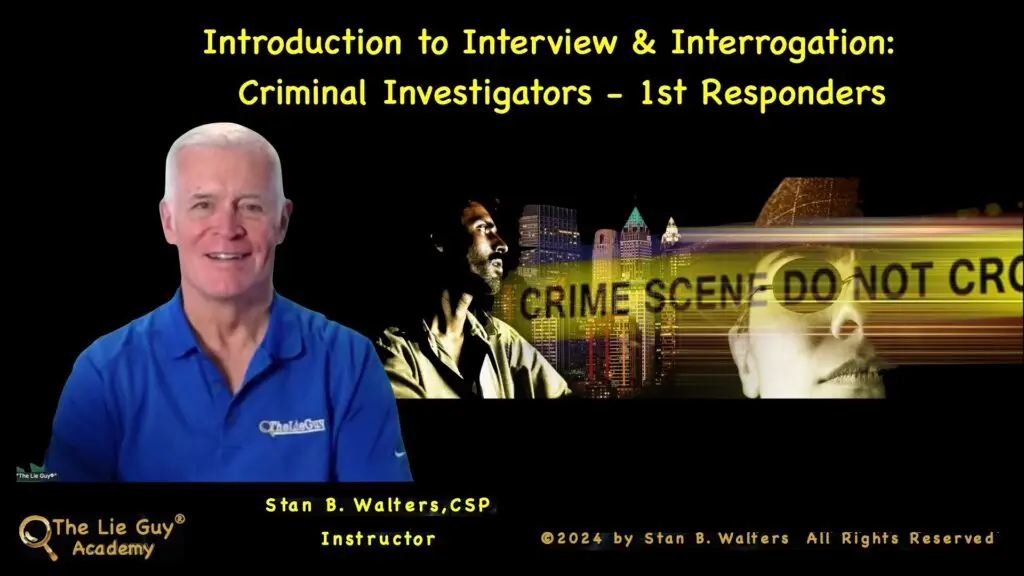
Introduction to Interview & Interrogation:
Criminal Investigators & 1st Responders
– 6 Hour Virtual Course
Presented Live
Stan B. Walters, “The Lie Guy® CSP, CVP – Instructor
A critical pillar of the investigative process is the interviewing of victims, witnesses, sources and potential suspects. Imagine the direct impact, both positive and negative that the quality of the information gained and the interview and interrogation tactics used can have on the prosecution of a case. The simple truth is that the courts have already started focusing on the faulty and in some cases extremely dated methods and techniques currently in use.
The plan of action for this course is provide an updated foundation of productive as well as ethical interview and interrogation techniques. Allowing new detectives, criminal investigators and first responders to develop their skills by “trial and error” is unacceptable. The ultimate cost of legal liability and subsequent litigation is quickly reaching an unsustainable level. Especially since the problem could avoided by early training in the current science of interview and interrogation.
- Master the Interviewer’s Impact Principle: Discover how your presence, demeanor, and approach can significantly influence the flow of information and the outcome of an interview.
Leverage the 4 Pillars of a Successful Interview: Learn to apply these key strategies to unlock over 60% more crucial information from your subjects.- Avoid the 3 Fatal Pitfalls: Identify and sidestep the most common mistakes that can derail an interview, ensuring your efforts lead to actionable insights.
- Implement the Strategic Use of Evidence Tactic: Understand how to strategically introduce evidence during interrogations to elicit truthful responses without compromising ethics.
- Decode a Subject’s Purpose of Action: Gain the skills to read between the lines and uncover the true motivations behind a subject’s actions.
- Navigate the Growing Trend of Interview Recordation: Stay ahead of legal trends by mastering the best practices for recording interviews and interrogations, protecting both the integrity of the process and your agency from legal challenges.
This course is designed for a wide range of professionals committed to sharpening their interview and interrogation skills, including:
• Detectives (New & Seasoned)
• Criminal Investigators at all experience levels
• First Responders & Interdiction Officers
• Accident, Health & Safety Investigators
• Regulatory & Compliance Investigators
• Corporate Loss Prevention Specialists & Risk Managers
• Fire/Arson Investigators & Special Investigations Units
• Correctional Officers & Probation
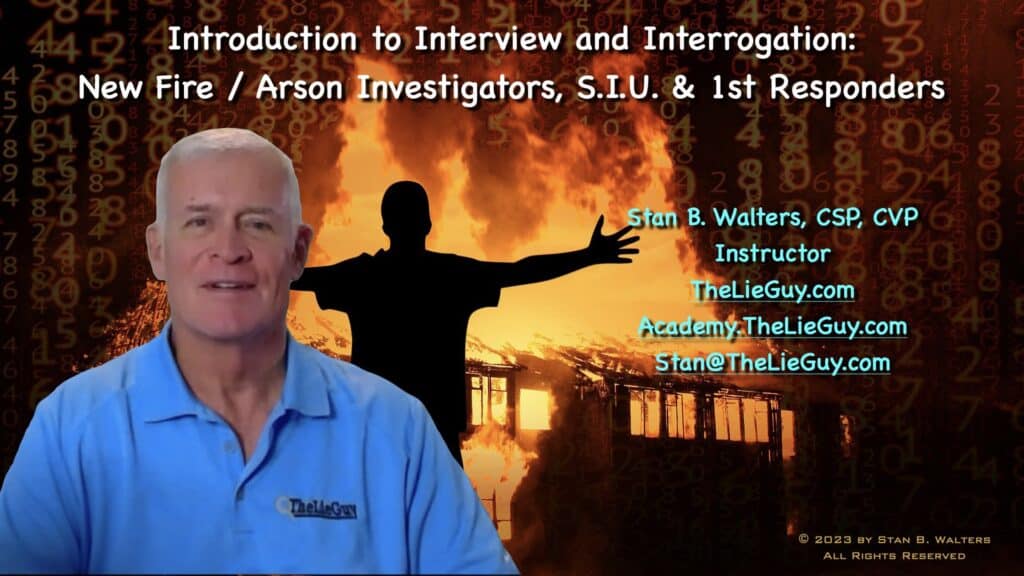
Introduction to Interview and Interrogation:
New Fire / Arson Investigators, S.I.U. & 1st Responders
– 6 Hour Virtual Course
Presented Live
Stan B. Walters, “The Lie Guy® CSP, CVP – Instructor
The most critical element of any investigative process is the interviews of victims, witnesses, sources and potential suspects. Whether as a first responder on scene or conducting the subsequent follow on investigation, fire / arson cases are not an exception. The interviews of property owners or other insured parties, witnesses, and victims have a direct impact, both positive and negative on the quality of the information gained and the progression of a case toward resolution. The interview tactics investigators use can affect any subsequent civil or criminal the prosecution of a case. The simple truth is that the courts have already started focusing on the faulty and in some cases extremely dated interview and interrogation methods and techniques still in use.
The mission of this course of instruction is to provide an updated foundation of cutting edge as well as ethical interview and interrogation techniques. Allowing new as well as seasoned fire / arson / fraud investigators and first responders to develop or revitalize their skills by “trial and error” or “that’s the way we have also done it” approach is absolutely unacceptable. The ultimate cost of legal liability and subsequent litigation is quickly reaching an unsustainable level. Especially since the problem could avoided by early training in the current science of interview and interrogation.
- Understanding the “Interviewer’s Impact Principle”
- Using the “4 Elements of a Successful Interview” to gain 60%+ more information.
- Defining the Narrative-Based Interview Approach.
- 3 fatal flaws that sabotage an interview.
- The “Strategic Use of Evidence” Tactic.
- Decoding and Understanding a Subject’s “Purpose of Action.”
- Fire / Arson Investigators
- Fire 1st Responders
- State / Local Fire Marshal’s Offices
- Wildfire Investigators
- Marine Fire Investigators
- Federal and State Departments of Interior
- Federal Agents assigned to investigate fires.
-
N.T.S.B. Fire Investigators
- Chemical Safety and Hazard Board Investigators
- Environmental Safety / Protection Agencies
- Insurance Claims Adjusters
- Insurance Underwriters
- Insurance Special Investigations Units

